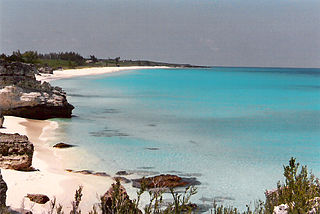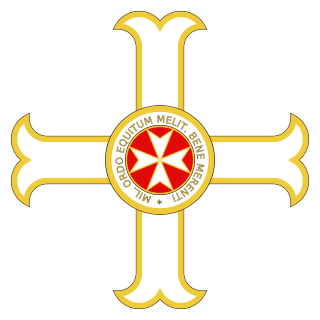
The Bahamas, officially the Commonwealth of The Bahamas, is an island country within the Lucayan Archipelago of the West Indies in the Atlantic Ocean. It contains 97% of the Lucayan Archipelago's land area and 88% of its population. The archipelagic state consists of more than 3,000 islands, cays, and islets in the Atlantic Ocean, and is located north of Cuba and northwest of the island of Hispaniola and the Turks and Caicos Islands, southeast of the U.S. state of Florida, and east of the Florida Keys. The capital is Nassau on the island of New Providence. The Royal Bahamas Defence Force describes The Bahamas' territory as encompassing 470,000 km2 (180,000 sq mi) of ocean space.

The Legion of Merit (LOM) is a military award of the United States Armed Forces that is given for exceptionally meritorious conduct in the performance of outstanding services and achievements. The decoration is issued to members of the eight uniformed services of the United States as well as to military and political figures of foreign governments.
Orders of Commonwealth countries.

The Berry Islands are a chain of islands and a district of the Bahamas, covering about thirty square miles (78 km2) of the northwestern part of the Out Islands.

An order is a visible honour awarded by a sovereign state, monarch, dynastic house or organisation to a person, typically in recognition of individual merit, that often comes with distinctive insignia such as collars, medals, badges, and sashes worn by recipients.

The Philippine Legion of Honor was established by President Manuel Roxas, through Philippine Army Circular No. 60 dated July 3, 1947. The Philippine Legion of Honor was patterned after the Legion of Merit of the United States of America, and was meant to honor both civilians and members of the military, Filipino or foreign. Originally, like the U.S. Legion of Merit, the Philippine Legion of Honor had four classes, known as degrees, with Legionnaire being the basic rank, and Chief Commander being the highest. With the reform of the Philippine system of orders and decorations in 2003, the Philippine Legion of Honor's classes were renamed "ranks" instead of "degrees", and the ranks expanded.
The orders, decorations, and medals of Canada comprise a complex system by which Canadians are honoured by the country's sovereign for actions or deeds that benefit their community or the country at large. Modelled on its British predecessor, the structure originated in the 1930s, but began to come to full fruition at the time of Canada's centennial in 1967, with the establishment of the Order of Canada, and has since grown in both size and scope to include dynastic and national orders, state, civil, and military decorations; and various campaign medals. The monarch in right of each Canadian province also issues distinct orders and medals to honour residents for work performed in just their province. The provincial honours, as with some of their national counterparts, grant the use of post-nominal letters and or supporters and other devices to be used on personal coats of arms.
Representation of the People Act is a stock short title used in Antigua and Barbuda, The Bahamas, Bangladesh, Barbados, Belize, Ghana, Grenada, Guyana, India, Jamaica, Mauritius, Pakistan, Saint Vincent and the Grenadines, Trinidad and Tobago, the United Kingdom and Vanuatu for legislation dealing with the electoral system. Representation of the People Acts is a collective title for legislation relating to representation of the people, including Rating Acts and other Registration Acts. The title was first used in the United Kingdom in the 1832 Great Reform Act and was adopted in other countries of, or formerly part of, the British Empire through the spread of the Westminster parliamentary system.

The Medal for Merit was the highest civilian decoration of the United States in the gift of the president. Created during World War II, it was awarded by the President of the United States to civilians who "distinguished themselves by exceptionally meritorious conduct in the performance of outstanding services" in the war effort "since the proclamation of an emergency by the President on September 8, 1939". Awards to civilians of foreign nations were eligible "only for the performance of exceptionally meritorious or courageous act or acts in furtherance of the war efforts of the United Nations." It was last awarded in 1952.

An order of merit is an honorific order that is conferred by a state, government, royal family, or other sovereign entity to an individual in recognition of military or civil merit. The historical background of the modern honours system of orders of merit may be traced to the emergence of chivalric orders during the Middle Ages.
Portugal has a system of orders, decorations, and medals as a means of honouring individuals for personal bravery, achievement, or service to Portugal.
Sir Durward Randolph Knowles was a sailor and Olympic champion from The Bahamas. He won the gold medal in the Star class at the 1964 Summer Olympics in Tokyo, together with Cecil Cooke. He won the bronze medal in the same class at the 1956 Summer Olympics in Melbourne. He had previously competed for the United Kingdom in the 1948 Olympics, finishing in 4th place in the Star class together with Sloane Elmo Farrington. Representing the Bahamas, Knowles also won gold in the 1959 Pan American Games star class. He is one of only five athletes who have competed in the Olympics over a span of 40 years, along with fencer Ivan Joseph Martin Osiier, sailor Magnus Konow, showjumper Ian Millar, and sailor Paul Elvstrøm.
Shonel Laverne Ferguson MBE is a former track and field athlete from the Bahamas, who competed in the women's sprint and long jump events during her career. She is a three-time Olympian. Ferguson was inducted into the Bahamas Track and Field Hall of Fame in 1993.
The Medal of Military Valor is an Italian medal, originally established as a Sardinian award. It is awarded to military personnel, units above the level of company, and civilians for exceptional valor in the face of the enemy.

The Order of Merit is a Portuguese Honorific Order of civil merit intended to award those responsible for meritorious acts or services performed in the exercise of any functions, both in the public and the private sphere, which reveal self-sacrifice in favor of the community. The decorations are given by the President of the Portuguese Republic, in his role as the Grand-Master of the Portuguese Honorific Orders. The Order of Merit can be awarded, during life or posthumously, to both Portuguese and foreign citizens; it can also be awarded to localities or institutions that are legal persons governed by public law or of public utility. This order has been awarded to a number of people performing the most diverse functions such as ambassadors, businesspeople, military personnel, athletes and musicians.
Thawāb, Sawab, Hasanat or Ajr is an Arabic term meaning "reward". Specifically, in the context of an Islamic worldview, thawāb refers to spiritual merit or reward that accrues from the performance of good deeds and piety.
The current honours system of the Republic of Malta has its foundation in the 17 October 1975 Ġieh ir-Repubblika Act. This act has been subsequently amended by Acts XXXVII of 1976, XIII of 1983, XIV of 1990, XI of 1991 and XV of 1993; Legal Notice 423 of 2007; and Acts VI of 2008, V and XVII of 2011, and XIX of 2013. This act lays out the structure of the orders and medals of Malta. Subsidiary legislation spells out details missing in the initial act and also established national commemorative medals. The honours system of Malta can be broken down into three general parts, the National Order of Merit, Xirka Ġieħ ir-Repubblika, and Medals of the Republic.
The Greek honors system goes back to 1829 and the establishment of the Order of the Redeemer at the Fourth National Assembly at Argos. However, the relevant decree was signed in Nafplio by King Otto on May 20, 1833. The Grand Cross of the Order of the Redeemer remains the highest honor of Greece to this day.
The Order of Merit is an honour that can be given by the government of the Bahamas. It was founded in 2016.







